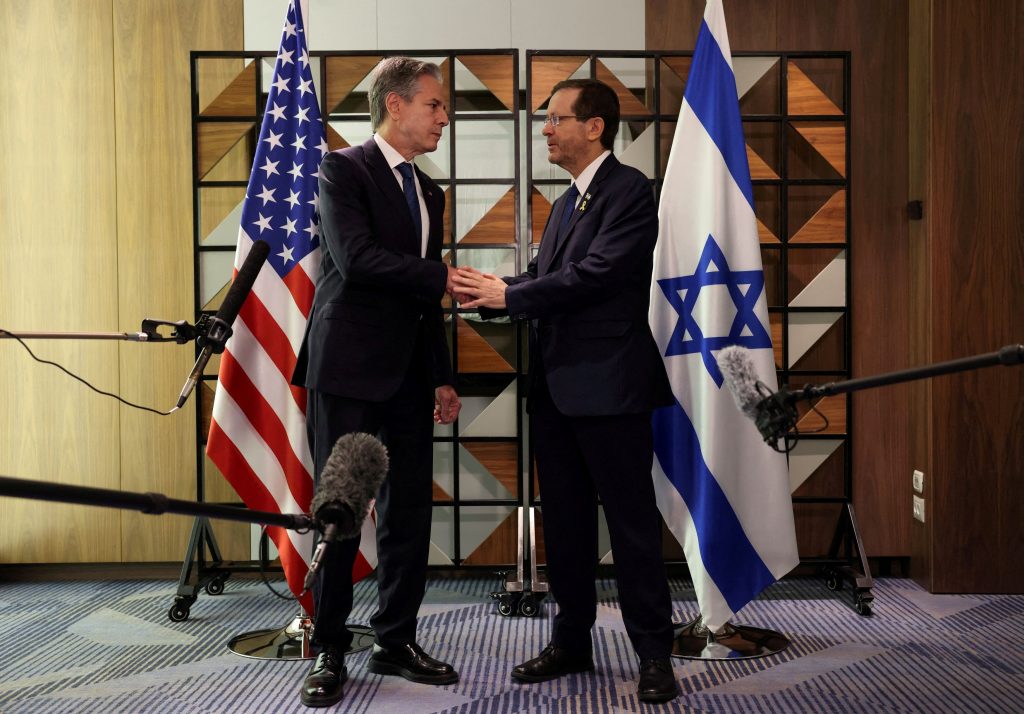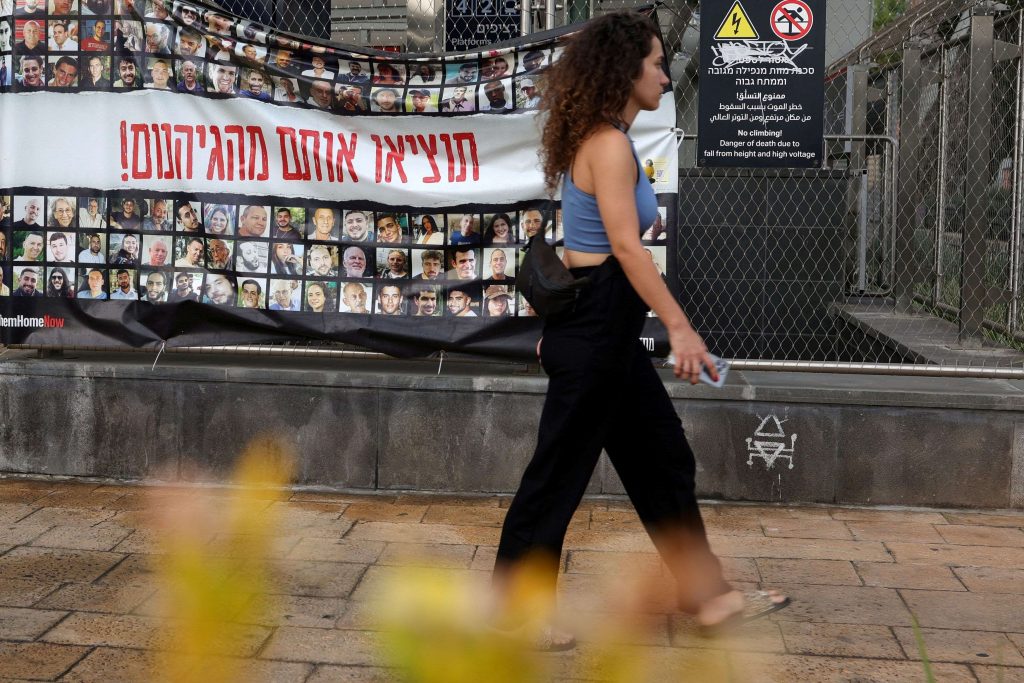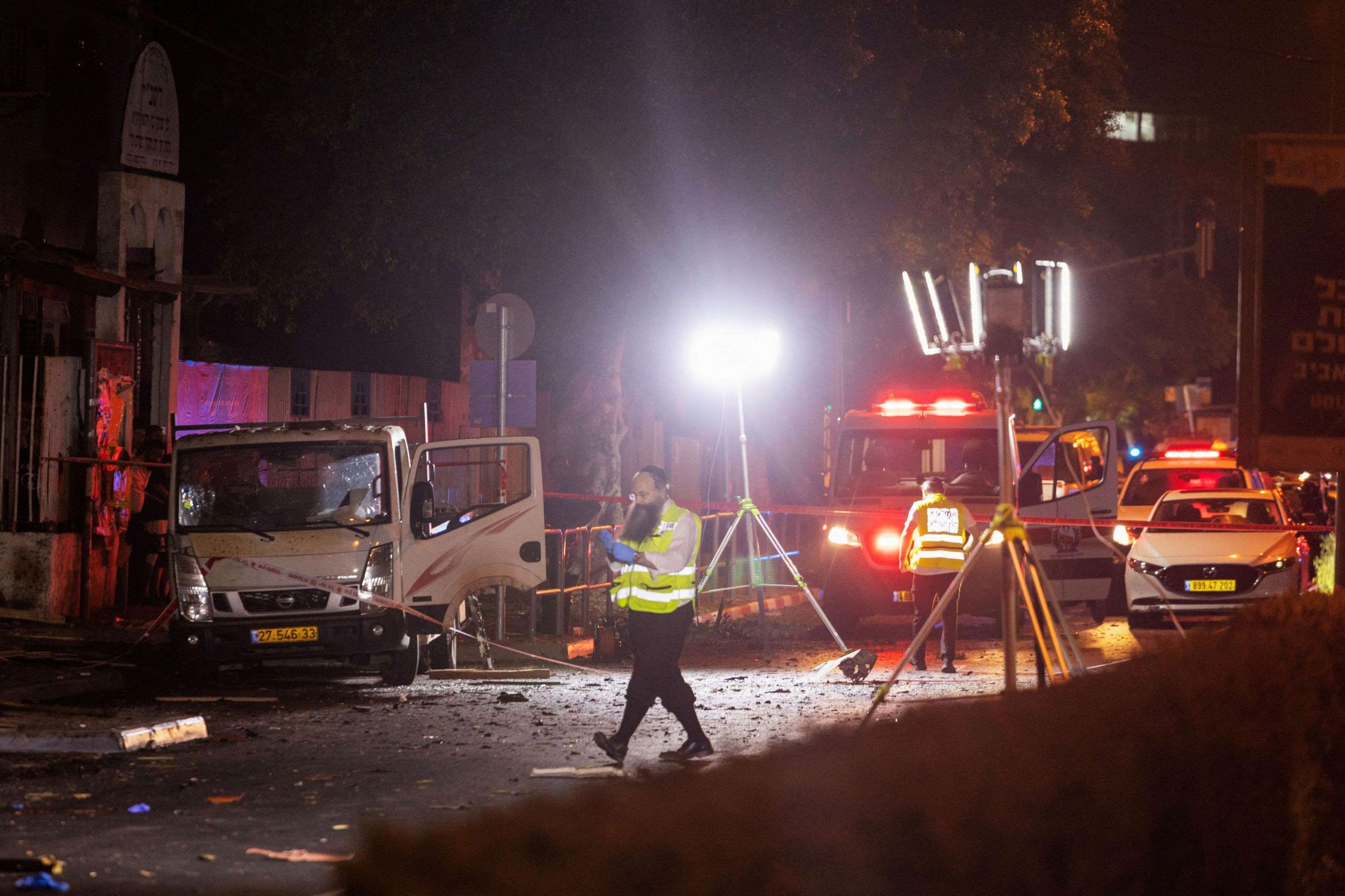Hamas and Palestinian Islamic Jihad claimed responsibility for a suicide bombing attempt in Tel Aviv, threatening to open a violent new chapter of the conflict as U.S. Secretary of State Antony Blinken arrived in Israel to press for a cease-fire.
A Palestinian from the West Bank was killed by a powerful explosion late Sunday when a bomb that the person carried went off, moderately injuring one bystander, Israeli police said. Hamas and Islamic Jihad called it a “martyrdom operation”—their term for a suicide attack—and said more would come as long as the war continues.
While the bomb detonated prematurely according to the latest police assessment, the attempt harked back to waves of suicide bombings that undermined peace efforts in past decades. Israel’s security forces have largely prevented such bombings in recent years.
The U.S.-designated terrorist groups said Monday that such operations would “return to the forefront” as long as the war continues.
“I really hope this doesn’t hint of a return to suicide attacks which we experienced in full force 20 years ago,” said Guy Aviad, a researcher on Hamas and a former Israeli military officer, referring to the Palestinian suicide bombings during the Second Intifada, an uprising that ran between 2000-05.
U.S. diplomats are racing to secure a cease-fire in the Gaza Strip and de-escalate regional tensions. Blinken, who said he was visiting Israel for the ninth time since the start of the war, met with Prime Minister Benjamin Netanyahu, President Isaac Herzog, Defense Minister Yoav Gallant and others to discuss cease-fire efforts following a two-day summit in Doha in which the U.S. presented what it said was a comprehensive proposal to bridge the gaps between Israel and Hamas.
“I’m here as part of an intensive diplomatic effort on President Biden’s instructions to try to get this agreement to the line, and ultimately over the line,” Blinken said ahead of his meeting with Herzog in Jerusalem, warning parties against further escalating the conflict and derailing the talks.
Blinken is set to meet Egyptian President Abdel Fattah Al Sisi on Tuesday and negotiation delegations are expected to meet in Cairo later in the week.
While the White House has conveyed optimism about cease-fire talks, few mediators or others around the talks say they believe a deal is likely. The stakes include not just the fighting in Gaza but the prospect of a wider war, as Iran and Hezbollah prepare to respond to a pair of Israel-linked killings in Tehran and Beirut.

U.S. Secretary of State Antony Blinken meets with Israel’s President Isaac Herzog, in Tel Aviv, Israel, August 19, 2024. REUTERS/Kevin Mohatt/Pool
The biggest sticking points include at what point a permanent halt to the fighting would be declared. Netanyahu has insisted that Israel have the ability to resume fighting until Hamas is destroyed. Hamas has dropped its demand that an end to the war and full Israeli withdrawal be established in the first phase of a deal, when some Israeli hostages would be exchanged for Palestinian prisoners, but only if talks toward a permanent cease-fire continue into the next phase.
Other obstacles to a deal include Israel’s demands that it retain some forces at the Philadelphi corridor, a nine-mile border between Egypt and Gaza that Israel took over in May, and for an international body to screen Palestinians returning to northern Gaza.
Israel is also pushing for a wall to be built on the corridor to prevent Hamas from digging tunnels and wants access to feeds from cameras and sensors monitoring the area, Arab mediators said. An Israeli technical team wrapped up meetings with counterparts in Cairo to discuss the corridor and the Rafah border crossing with little progress, according to mediators.
The attempted bombing threatened to further sour the atmosphere around the talks.
“The Palestinian resistance launched a new model through the ‘Tel Aviv’ operation,” Hamas official Osama Hamdan said Monday in a television interview with Al Araby. “Israeli intransigence will push the resistance to escalate its actions further.”
Netanyahu and Hamas leader Yahya Sinwar have resisted an agreement for months, negotiators and officials in their own camps say, while pressure to strike a deal has grown.
The Israeli prime minister has denied accusations that he is hindering the talks. He has said the negotiations can be pushed forward by increasing pressure on Hamas on the battlefield.
Sinwar—who is believed to have engineered the Oct. 7 attacks on Israel that left 1,200 people dead and around 250 taken hostage, according to Israeli authorities—took over leadership of Hamas after his predecessor was killed last month in Tehran. Sinwar has hardened the group’s negotiating stance.
Hamas has yet to send representatives to the talks. Sinwar believes the latest round of talks is a bluff intended to grant additional time for Israel to wage its military campaign, according to Arab mediators. He has hoped to increase pressure on Israel by widening the conflict, including attacks from the West Bank, the mediators say.
Israel has conducted several raids to quell what it says is increased militant activity in the West Bank.

A woman walks past posters of hostages, most of whom were kidnapped during the deadly October 7 attack by Hamas, in Tel Aviv, Israel, August 19, 2024. REUTERS/Florion Goga
Intensified attacks in the West Bank would stretch Israeli forces thin between several fronts, including Gaza and Israel’s northern border with Lebanon, where tit-for-tat fighting is taking place daily with Hezbollah, Aviad said. Israel would likely be forced to redeploy forces from Gaza to the West Bank in such a scenario, he said.
“Sinwar has full interest for this to happen,” he said.
More than 40,000 people in Gaza have died in the fighting, mostly civilians, according to Palestinian health authorities, who don’t say how many were combatants.
The U.S. has argued that a cease-fire in Gaza could head off a wider conflict. It has presented a proposal to bridge the gaps between the parties.
The U.S. bridging proposal includes an agreement by Israel to free some high-profile Palestinians who are serving long jail sentences, but without a commitment to numbers or whether they would be forced into exile. In exchange, Hamas would be expected to release all female Israeli soldiers and U.S. dual citizens in the first stage of the deal, according to Arab mediators.
The U.S. fears a strike by Iran or its militia allies including Hezbollah could spark yet another military response from Israel and ignite a wider war.
-Saleh al-Batati contributed to this article.



